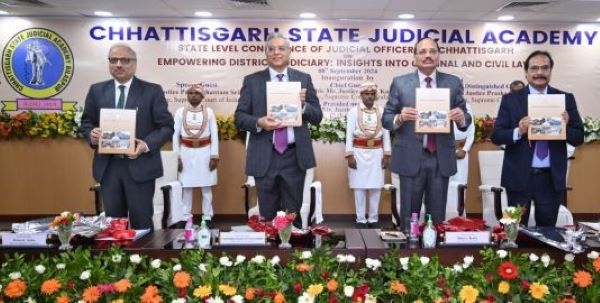
Team News Riveting
Raipur, September 8
Chhattisgarh State Judicial Academy under the aegis of High Court of Chhattisgarh hosted a state-level conference of judicial officers on “Empowering District Judiciary- Insights into Criminal and Civil Laws” on Sunday at the auditorium of the High Court.
The inaugural session of conference was graced with presence of Supreme Court Judges including Justice Surya Kant as chief guest, Justice PS Narasimha as special guest, Justice Prashant Kumar Mishra as distinguished guest.
The inaugural session commenced with the ceremonial lighting of the lamp by Chief Guest Justice Surya Kant. The Chief Justice of the High Court of Chhattisgarh, Justice Ramesh Sinha delivered a heartfelt welcome address to the dignitaries and participants.
Justice Surya Kant emphasized role of District Judiciary as first point of contact with litigant in civil and criminal litigation at threshold level. He stressed upon the role of Trial Judges in dealing with procedural technicalities and practical challenges posed with District Judiciary. His Lordship expressed that Judges from District Judiciary are accountable firstly to High Court, their own conscience and most importantly to the public at large as consumers of Justice.
He urged the Judicial Officers that any procedural technicalities and impediments cannot hinder the zeal and commitment to arrive upon logical conclusion and decision making of a Judge. He stressed that rather than adopting for an individual approach towards any impediments, it should be addressed with institutional approach towards effective redressal of such impediment. He also emphasized the need of hour to address and discourage frivolous and chance litigations at the threshold level through a strong and bold District Judiciary.
Justice Surya Kant’s speech was a call to action, reminding attendees of their noble responsibilities and inspiring them to strive for boldness, excellence and integrity in their duties.
Justice PS Narasimha in his keynote address emphasized that Constitution of India recognizes District Courts not as just statutory courts but Constitutional functionaries as its origin is embedded in Constitution of India. He stressed that District Judiciary provides primary and most accessible interface for a litigant in terms of linguistic and geographical accessibility. He expressed that District Courts acts as first Guardian of personal liberty in both Civil and Criminal domain.
Justice P S Narasimha also stressed upon Empowerment of a Judge through equipping a Judge with knowledge by bestowing him with needful resources and technological accessibility. He highlighted about a Judge’s pivotal role in judicial decision making with reasoning and cautioned that the judicial decision-making process must not be entirely dependent upon use of technology or Artificial Intelligence as the same may adversely impact human decision making and reasoning at certain point of time.
Justice Prashant Kumar Mishra during his address quoted that Civil and Criminal Laws are pillars of the whole judicial system and insights into civil and criminal laws become more significant with introduction of new laws. Highlighting upon the importance of role of District Judiciary, Justice Prashant Kumar Mishra said that law is interpreted and developed by High Courts and Supreme Courts based upon the foundation towards new approach or interpretation put forth by District Courts.
In his introductory and welcome address, Chief Justice Ramesh Sinha expressed his profound honor and privilege in welcoming the distinguished guests from Supreme Court of India, Justice Surya Kant, Justice PS Narasimha and Justice Prashant Kumar Mishra. Highlighting upon the importance of State Level Conference, Chief Justice Ramesh Sinha said “Our objective through this conference is to foster a robust platform for the exchange of knowledge, experiences, and best practices among judges and judicial officers.”
Chief Justice Ramesh Sinha emphasized that the conference symbolizes a shared commitment to enriching and reinforcing the core of justice delivery system- The District Judiciary and the synergy of minds would pave ways for innovative solutions and strategies for a more effective and efficient District Judiciary .
A book titled “District Courts of Chhattisgarh” highlighting the diversity in geography, culture and people with information about various District Courts across the State and scholarly articles from judicial officers were also unveiled during the conference.
The inaugural session shared commitments to address the pressing issues faced by the District judiciary and to collaboratively seek solutions that will enhance the delivery of justice in Chhattisgarh. The conference aims to explore innovative strategies, share best practices, and envision a path forward to strengthen the judiciary. The inaugural session concluded with vote of thanks proposed by Justice Sanjay K Agrawal.
Inaugural Session was followed by Technical Sessions. First Technical Session was chaired by Justice Sanjay K Agrawal and Justice Arvind Kumar Verma, wherein presentations were given by Civil Judges Dilli Singh Baghel, Mrs Shweta Shrivastava, Mrs Neha Yati Mishra and Sarva Vijay Agrawal.
While Second Technical Session was chaired by Justice Naresh Kumar Chandravanshi and Justice Sachin Singh Rajput, wherein presentations were given by Principal District Judge Vijay Kumar Hota, Mrs Sushma Sawant, Maneesh Kumar Thakur and District Judge Mrs Neeru Singh. During such technical sessions, challenges and innovative solutions for Civil and Criminal trial proceedings before District Judiciary were specifically addressed.
The State Level Conference concluded with Valedictory address delivered by Justice Parth Prateem Sahu.
Chief Justice Ramesh Sinha expressed his heartfelt gratitude to Hon’ble Judges of the Supreme Court, who spared their valuable time for gracing the event with their presence and insights. He also expressed his thanks to fraternity of Judges of High Court and participant judicial officers, registry officers, officers of CSJA , print and electronic media and all stakeholders, who directly or indirectly contributed towards the historic success of this state level conference



